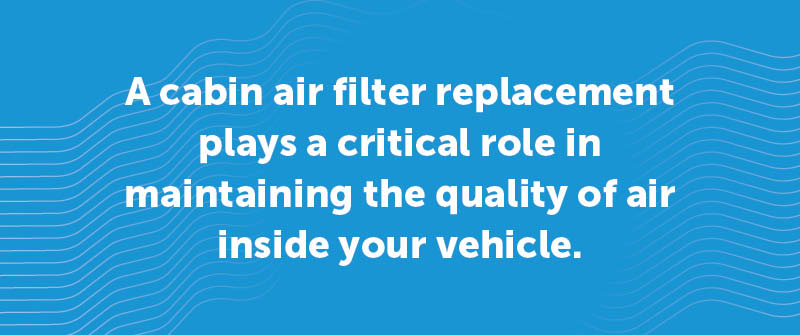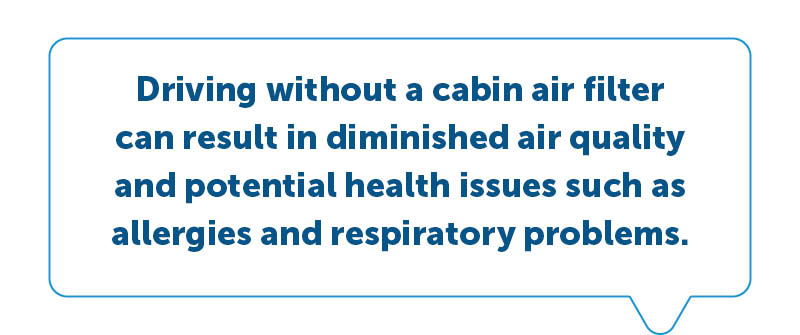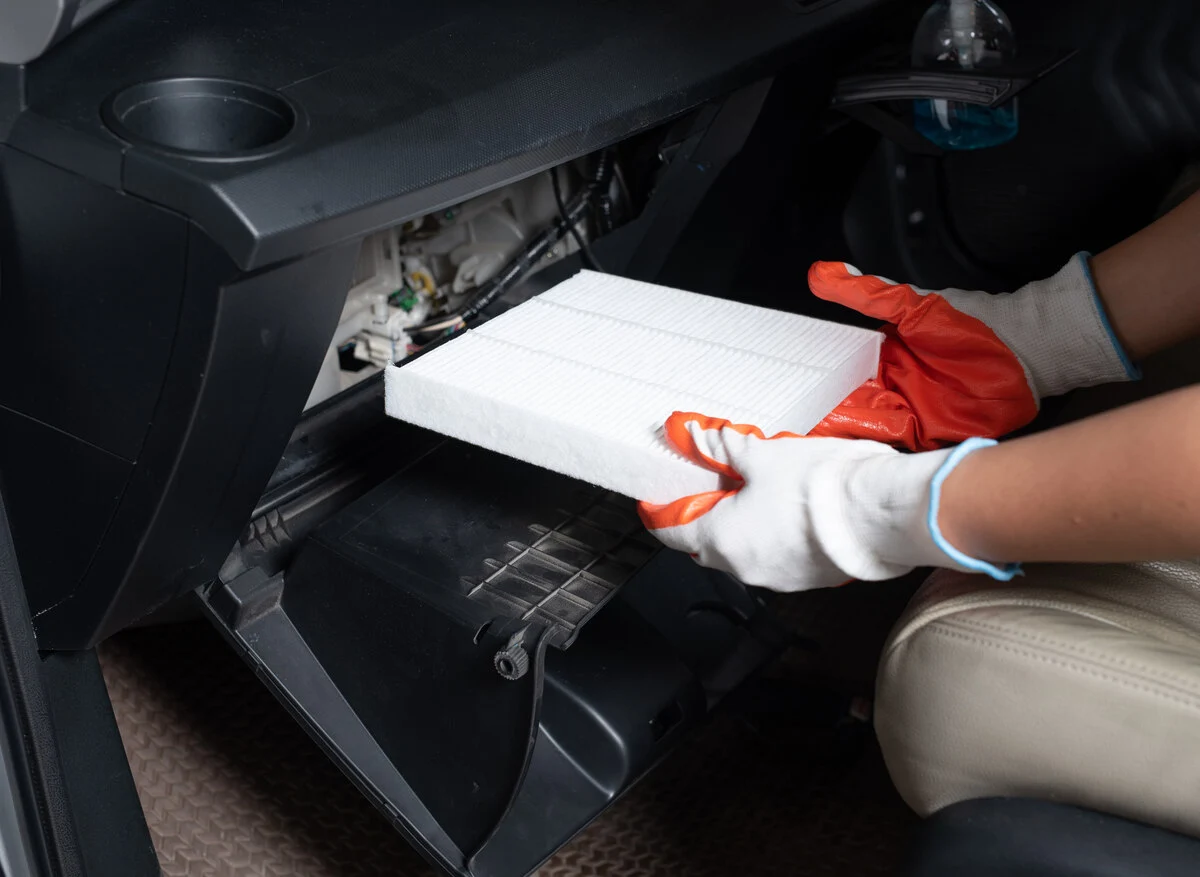Is It Okay To Drive Without A Cabin Air Filter?
Cabin air filters play an essential role in maintaining the air quality inside your car’s interior. They act as a barrier that catches dust, pollen, and other allergens that enter through your car’s heating, ventilation, and air conditioning system. While technically possible to drive without one, doing so may compromise your health and the health of your passengers.
Importance of Cabin Air Filters in Maintaining Air Quality
Without a cabin air filter, the air inside your car can become laden with harmful pollutants. For those with respiratory problems or allergies, exposure to these contaminants can exacerbate their conditions. A functioning cabin air filter ensures you breathe cleaner air, making your drive more pleasant and healthy.
Potential Consequences of Driving Without a Cabin Air Filter
Leaving the filter out can lead to several unwanted issues. For instance, particles normally trapped by the filter can accumulate within the HVAC system. This buildup can eventually impair the system’s performance and significantly impact air flow, causing discomfort, particularly during extreme weather conditions.
Impact on Vehicle Occupants’ Health
Not using a cabin air filter means dust and allergens aren’t filtered out, directly affecting passengers’ health. This is particularly dangerous for individuals with asthma or severe allergies, as unfiltered cabin air can trigger attacks or allergic reactions. Allowing outside air to flow into the cabin is essential for maintaining good air quality, and regular replacement of your car’s cabin air filter is a simple yet crucial task for ensuring a healthier driving environment. At Discount Filters, we provide high-quality cabin filters designed to keep the air in your car as clean as possible, ensuring the well-being of all passengers.
What Happens If I Don’t Change My Cabin Air Filter?
A cabin air filter replacement plays a critical role in maintaining the quality of air inside your vehicle. Over time, changing cabin air filters becomes indispensable, given the impact a dirty filter can have. Over time exposure to air pollution from old or clogged filters can impact cognitive function, stress hormone levels, and cardiovascular function.

Signs that a Cabin Air Filter Needs Replacement
One of the most noticeable signs that your cabin air filter needs changing is an unpleasant odor inside the vehicle. As the filter accumulates dust, pollen, and other debris, it tends to emit a musty smell. Another tell-tale sign is restricted airflow from the air conditioning vents, as the filter becomes clogged and prevents air from circulating efficiently. If you’re noticing unusually dusty dashboards or suffering from allergy symptoms while driving, a new filter should be on your to-do list.
Effects on Air Quality and HVAC System Performance
A dirty or clogged cabin air filter cannot effectively filter out contaminants, drastically affecting the air quality inside your car. This can mean more allergens, dust, and debris making their way into the cabin, potentially causing discomfort to passengers, especially those with respiratory issues. When changing cabin air filters is delayed, not only is air quality compromised, but it also places added stress on the HVAC system. The system must work harder to push air through the clogged filter, which can lead to decreased performance, poor air quality, and increased energy consumption. Similarly, maintaining the engine air filter is essential for optimal vehicle operation, as it plays a critical role in ensuring efficient engine performance.
Potential for Odors and Allergens
As the cabin air filter traps moisture along with pollutants, there’s a risk of mold and mildew growth if not replaced regularly. The presence of mold spores can lead to health problems and result in unpleasant odors permeating the interior of the car. By neglecting to replace your cabin air filter, you allow these pollutants to circulate freely, creating an unhealthy environment inside your vehicle. To access the cabin air filter, you often need to remove the glove box, which is a straightforward process that can significantly improve air quality once the filter is replaced.
Overall, regularly changing cabin air filters is a small yet significant maintenance task that ensures a better driving experience through improved air quality, efficient HVAC system operation, and the prevention of unwanted odors.
Can I Run My AC Without A Cabin Air Filter?
Impact of a Cabin Air Filter on AC Efficiency
The cabin air filter is a critical component in ensuring your vehicle’s air conditioning system functions efficiently. Without a clean and effective cabin air filter, your vehicle’s AC has to work harder to push air through the system. This is because the filter is responsible for trapping dust, pollen, and other fine particles, essentially facilitating smooth airflow within the cabin. If the filter is absent or clogged, the AC’s performance may be compromised, leading to insufficient cooling. Therefore, regular cabin air filter replacement is essential to maintain optimal air quality and AC efficiency.
Possible Damage to AC Components Without a Filter
A few seconds of running your AC without a cabin air filter can expose the system to contaminants that may cause wear and tear on its components. Such particulates can enter the AC system, leading to blockages or damage over time. Dust and debris can accumulate and damage essential parts, potentially resulting in expensive repairs or replacements of parts such as the blower motor or condenser. Therefore, it is crucial to replace the old filter with a new filter to ensure the longevity and efficiency of your AC system.
Recommended Practices for AC and Cabin Filter Maintenance
To optimize your vehicle’s filtered air and AC efficiency and prolong its longevity, regular cabin air filter replacement is recommended. It is generally advisable to check and replace your cabin air filter every 12,000 to 15,000 miles or as specified by the vehicle manufacturer. This ensures that the filter remains effective in trapping contaminants that could otherwise harm the AC system. Not only will this practice maintain efficient cooling and air quality, but it also prevents long-term damage and ensures a healthier environment inside the car.
Conclusion
In summary, cabin air filters play a crucial role in maintaining the air quality within your vehicle, directly impacting the health and comfort of all occupants. These filters trap dust, pollen, smog, and other pollutants, preventing them from circulating through your car’s HVAC system and into the cabin. Driving without a cabin air filter or ignoring regular replacements can result in diminished air quality and potential health issues such as allergies and respiratory problems.

Best Practices for Maintaining Cabin Air Filter Health
Regular maintenance is key to ensuring your cabin air filter continues to operate effectively. Typically, it’s advisable to replace your cabin air filter every 15,000 to 25,000 miles or as recommended by your vehicle’s manufacturer. However, if you frequently drive in areas with high pollution or dusty conditions, more frequent replacements might be necessary. Always refer to your owner’s manual for specific guidance.
Long-term Benefits of Regular Filter Replacement
Committing to regular filter replacement, including installing a new filter, offers long-term benefits that extend beyond just cleaner air. It helps in maintaining the efficiency of your vehicle’s HVAC system, ensuring your air conditioning and heating are not only effective but also energy-efficient. Plus, a well-maintained system helps sustain your vehicle’s resale value and reduces the likelihood of unexpected repairs caused by clogged systems or dirty AC components.
Don’t compromise on your comfort and health. Enhance your driving experience by ensuring your car’s environment is as clean and comfortable as possible. Discover our extensive range of cabin air filters at Discount Filters, designed to meet the specific needs of your vehicle. When you choose our high-quality filters, you’re investing in the cleanest air for your journeys and the well-being of your passengers.

